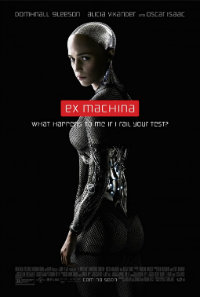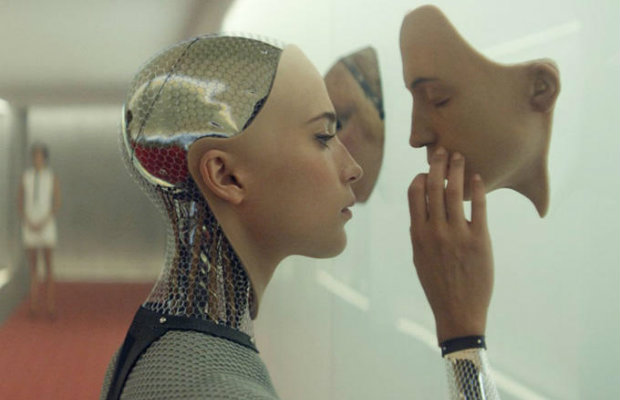Reviews
Ex Machina | Review
Imitation Game: Garland’ s Compelling Debut Explores Human’s Technological Hubris
 Excitingly presented and intelligently written, screenwriter Alex Garland’s directorial debut Ex Machina is certainly one of the more well-versed modern examinations of man kind’s moral struggles as pertains to the symbiotic relationship with the continued honing of artificial intelligence.
Excitingly presented and intelligently written, screenwriter Alex Garland’s directorial debut Ex Machina is certainly one of the more well-versed modern examinations of man kind’s moral struggles as pertains to the symbiotic relationship with the continued honing of artificial intelligence.
Presented as a sort of take on The Island of Dr. Moreau but with a madman amongst gendered machines, Garland manages to create a series of narrative levels within the film. Unconcerned with the how or why of the scenario, Garland glides us straight into a lithe and increasingly intense narrative centered on the concept of manufactured manipulation. Effective without getting hung up on certain questions that would seem impossible (even unnecessary) to answer, Garland achieves his desired outcome, examining the moral quandaries that accompany the possibilities of expanding horizons of intelligence in a future potentially nigh.
Caleb (Domhnall Gleeson) is a young programmer who has won the chance to participate in a mysterious experiment being administered by the man that runs his corporation, Nathan (Oscar Isaac). Flown into his secret, remote compound, Caleb is informed by Nathan that he has created an advanced form of artificial intelligence, a robot woman named Ava (Alicia Vikander). It is Caleb’s duty to interview Ava over the period of one week and administer the Turing Test, for if Ava is able to pass as human, then Nathan’s groundbreaking experiment would be deemed a success, placing mankind on a new technological horizon. But Caleb quickly finds himself becoming more than just fascinated with the beautiful Ava, who seems to be responsible for administering power surges in the compound so that she may have unmonitored moments with Caleb in order to tell him unnerving things about Nathan.
Garland honed his screenwriting skills writing a trio of excellent Danny Boyle films, including the maligned The Beach (2000), 28 Days Later (2002) and Sunshine (2007), all more or less concerned with humans at varied states of desperation directly engaged in survival or pursuit of a better existence. He’s continued with dystopic tendencies, having adapted Kazuo Ishiguro’s Never Let Me Go (2010) and the retooling of Dredd in 2012. With Ex Machina, he expands his interest with mankind’s willful undoing of itself as it struggles to contain control over its own, smarter creations. We’ve seen plenty of recent examples of this conflict, man vs. machine, but Garland’s quiet and eerie film hearkens back to the realm of Greek tragedy and mythology, beginning with its title, taken from the plot device referred to as ‘deus ex machine,’ wherein an object magically solves an impossible problem in the narrative.
Literally it means ‘god from the machine,’ shortened here to imply machines mutating into their own entities of agency. The film is peppered with references to mythological allusion, with Nathan declaring is invention to be Promethean, whereby a mortal character took fire from the gods and brought it down to man, thereafter punished by having an eagle chew out his liver every day…for eternity (the modern equivalent being the cirrhosis Nathan seems hell-bent on acquiring from his heavy drinking). Likewise, the set-up seems a direct example of modern day Icarus, flying too close to the sun with his wax wings (it’s important to note that all three main characters share names with prominent Biblical characters as well).
As the increasingly unhinged Nathan, Isaac is appropriately intense, with several not so unbelievable reveals concerning what exactly he’s doing with all these sexy lady robots he builds and then retires. The scenario recalls a slew of familiar genre pieces, from Blade Runner to The Stepford Wives (especially with the sex-maid Kyoko character played by Sonoya Mizuno), to the computer program of Spike Jonze’s Her.
Gleeson, for once, manages to be a sympathetic protagonist, hired to administer the Turing Test in relation to Ava’s ability to pass as human, despite the obviousness that she’s a machine. And therein lays mankind’s flaw, the emotional need to be liked, respected, desired and loved. In essence, we’re playing the Turing Test too, left to decide, whether forgetting she’s a machine or not, if we’re for or against Ava’s survival—for it surely indicates the demise of our own.
★★★½/☆☆☆☆☆
Los Angeles based Nicholas Bell is IONCINEMA.com's Chief Film Critic and covers film festivals such as Sundance, Berlin, Cannes and TIFF. He is part of the critic groups on Rotten Tomatoes, The Los Angeles Film Critics Association (LAFCA), the Online Film Critics Society (OFCS) and GALECA. His top 3 for 2021: France (Bruno Dumont), Passing (Rebecca Hall) and Nightmare Alley (Guillermo Del Toro). He was a jury member at the 2019 Cleveland International Film Festival.






















